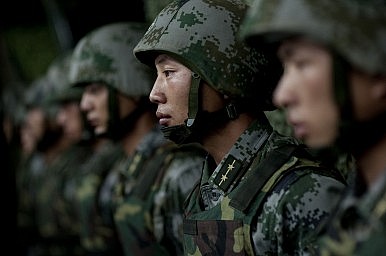By Robert Farley
 The question “How could war start between China and the United States?” has, quite reasonably, dominated much strategic analysis of East Asian politics. But wars that start have to end, sooner or later; Josh Rovner, associate professor in the School of International Service at American University, has repeatedly concentrated on the question “how does war between the United States and China end? In a recent article in the journal Diplomacy and Statecraft, Rovner notes that most analysts, and apparently most soldiers, expect that a war between China and the United States would end quickly. Theoretically, the collision of the two great reconnaissance-surveillance-strike complexes would quickly exhaust one side or the other of its most lethal weapons.
The question “How could war start between China and the United States?” has, quite reasonably, dominated much strategic analysis of East Asian politics. But wars that start have to end, sooner or later; Josh Rovner, associate professor in the School of International Service at American University, has repeatedly concentrated on the question “how does war between the United States and China end? In a recent article in the journal Diplomacy and Statecraft, Rovner notes that most analysts, and apparently most soldiers, expect that a war between China and the United States would end quickly. Theoretically, the collision of the two great reconnaissance-surveillance-strike complexes would quickly exhaust one side or the other of its most lethal weapons.
But Rovner points out the dilemma at the heart of U.S. war strategy: “If it tries to win quickly, it might trigger nuclear war. If it tries to reduce the risk of escalation, it may end up in an exhausting war of attrition.” While the U.S. and Chinese weapons are so lethal that they might soon exhaust one another, both sides have depth, and both have industrial strength that the war will not directly touch.
Rovner also suggests that spoilers on either side might prevent a peaceful conclusion to the conflict. The CCP would likely make a heavy investment of nationalist rhetoric into the conflict, making it difficult to agree to a settlement short of victory. And while the interests of the United States in the conflict area are not as immediate as those of China, the U.S. has displayed a remarkable tendency to stay in very long conflicts where it has no immediate interests. It is also unclear what terms the United States would demand from the Chinese. Regime change might be a step too far, although some voices in Washington would insist upon it.
Rovner doesn’t dwell much on the economic impact of the war, but it’s worth thinking about. The economic damage of a rupture of the world’s most important trade relationship (not to mention many ancillary relationships) would be immense and immediate, but this might ease over time, at least for the United States. China is more dependent than the United States upon maritime trade, and China cannot meaningfully threaten U.S. global trade routes. China also lacks the access that the U.S. has to global financial networks. At some point, continuing the war will force Beijing to give up the most substantial achievements of the Chinese Communist Party; a wealthy, prosperous, modern China.
Still, in the heat of conflict, nationalist passion may outweigh economic considerations. Decision-makers should take seriously the danger that a U.S.-China war would not end quickly, and that it would cause lasting damage to the global economic system. More than a few wars in the past have gone on much longer than their participants initially expected.
No comments:
Post a Comment